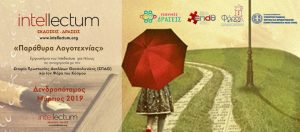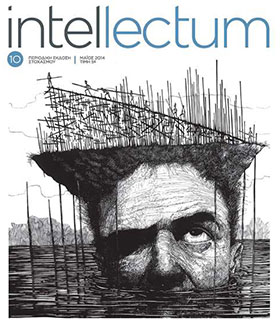The Greek myth of Erysichton of Thessaly, which was recorded by the poet Callimachus in his Hymn to goddess Demeter, seems to be the first ecological message in the history of humanity. A message that manifests the devastating consequences for humanity when it irrationally exploits the natural resources.
According to the myth, the sacrilegious King Erysichton, urged by his insatiable greed, cut down the goddess’s sacred trees and especially the one she loved the most, a huge oak tree in the heart of the forest. The punishment for this sacrilegious action was horrible, since he was sentenced by the goddess to eternal hunger. So the ordeal of Erysichton began who, after devouring his entire property, would devour his own flesh until death set him free.
The current reality in our state, as it is shaped by the immoral and outworn development policy of the Memorandums of Understanding, imposes a new way of interpretation of this instructive myth, in order to prevent the barbarization of the natural and man-made environment, save the cultural heritage of this land and above all allow the future generations to develop it on the basis of the viability, solidarity and quality development principles and according to our national fiscal resources.
In spite of that, however, via one more false-dilemma “growth or environment”, as well as the coercive “employment or environment”, a circle of international profiteering attacks nature, history and the memory of the civilization and ruthlessly destroys all those particular characteristics of our country, which would allow a truly endogenous and viable development. On the pretext of ‘green development’ and with ‘fast-track’ processes via transgressing the environmental, planning and archaeological legislation, the country’s entire wealth is sold out: seashore, forests, archaeological sites, caves and other public areas, who by the way are inalienable as stated by the Greek Constitution.
Apparently, Crete and Halkidiki constitute a favourite piece for the appetites of the international capitals, which exploit the European grants and promote this development tornado against nature, with the encouragement of their domestic supporters and certainly without the local communities’ knowledge. Therefore, according to the famous ‘Sun’ programme, all the crests of Crete are going to be covered by wind power, hybrid and photovoltaic stations. Thousands of square kilometers with unique vegetation, many of which belong to the ‘Natura’ network, such as the uniquely beautiful Azilakes or Skoureis forest (in eastern Crete and Halkidiki respectively), are deforested to be covered by millions of cubic meters of concrete and iron, so that enormous excavation craters can be formed and containers of millions of cubic meters can be constructed, in order to seize and fully control the most precious natural public good: the water (even if it is rain water – see film Even the Rain). It is obvious that the purpose of this new form of feudalism is not the promotion of the ‘green development’ in Crete and Halkidiki, but their transformation into an energy or gold factory, where – via the immunity provided by the Memorandums – the modern Erysichtons will satisfy their morbid plans, which not constitute an insult to the ecosystem. Similar attempts in other countries the last few years – with neighboring Romania as the most recent example – have already met the sturdy resistance of the residents, who try to protect the environment and their cultural heritage with the help of eminent personalities, such as Maia Morgenstern.
At the very opposite of this teratogenesis attempted in our land, how many jobs and beauty could be created via the alternative forms of tourism, i.e. the oil and wine roads, the archaeological and monasteries routes, the promotion of famous local products and the restoration of the architectural features of our settlements? Of course, there are many who identify the development with the ‘holocaust’ of the natural land and its selling out to the lenders and claim that any other project is a utopia, i.e. that everything is always a matter of resources and budget. But in the end, everything is a matter of ideas and education. Because in the present circumstances of the fierce globalization only the active citizens with mature and powerful awareness of the general public good can form a decent relationship with the environment.
Last week, an uncontrolled deforestation in the Skoureis forest was recorded by the workers of the Canadian company Eldorado, which was luckily stopped by the temporary decision of the Supreme Council of State. But until when? I truly wonder.
(Note: special thanks to Ms Youli Ierapetraki and the residents of Great Madonna in Halkidiki for information and data.)

